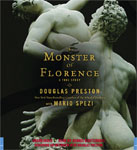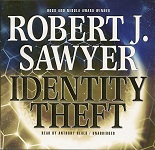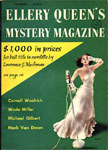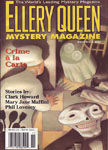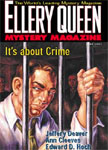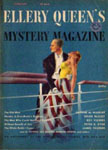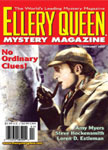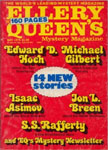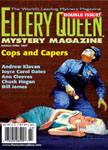

The 1990s was full of mystery in Canada. Weekday broadcasts on CBC Radio featured more than a dozen detectives in fully dramatized mysteries. This was a result of The Mystery Project. Perhaps the most listened to series under this banner was Midnight Cab, a half-hour mystery show about a 19 year old Toronto cab driver named Walker Devereaux. Here’s what Thrilling Detective has to say about Midnight Cab:
One of the best series airing as part of the Canadian Broadcasting Corporation’s The Mystery Project is Midnight Cab, which was aired in three runs of 13 episodes, 9 episodes, and 13 episodes (making a total of 35 episodes for the series).
…
The show starred David Ferry as WALKER DEVEREAUX, a young man, rather gullible and naive, from Bear River (north of Lake Superior) who comes to Toronto in order to become an author and winds up driving a cab on the midnight shift. From the start, he keeps running into problems (such as that body that someone left in the trunk of his cab), and he solves the mysteries with the help of his girlfriend, wheelchair-bound Krista Papadopoulos (who dispatches cabs), Alfonso Piatelli (his boss), and Metro Police Inspector Wilfred Kiss (a friendly homicide cop). Each episode is fairly self-contained, but the series builds on its past episodes as well, so we see Walker’s developing relationship with Krista, his coming to terms with the big city, etc.
Here’s the entire run…
Season 1:
 Season 1 – Episode 01 – The Mystery Of The Blue-Eyed Man
Season 1 – Episode 01 – The Mystery Of The Blue-Eyed Man
By James W. Nichol; Performed by a full cast
1 |MP3| – Approx. 28 Minutes [RADIO DRAMA]
Broadcaster: CBC Radio
Broadcast: November 14, 1992
Publisher: DH Audio / Paperback Audio
Published: March 1997
ISBN: 0886469295
Provider: Radio Mensa
On his way to pick up his first fare, Walker finds a body in the trunk of his car.
Season 1 – Episode 02 – The Mystery Of 22 Crier Drive
By James W. Nichol; Performed by a full cast
1 |MP3| – Approx. 30 Minutes [RADIO DRAMA]
Broadcaster: CBC Radio
Broadcast: November 21, 1992
Provider: Radio Mensa
Walker Devereaux, a 19-year-old aspiring writer, takes a job driving a cab. Lovable and intelligent by naïve, he stumbles on a succession of mysteries while working the graveyard shift. Unfortunately he is an amateur detective who can’t stop stumbling into trouble on Toronto’s dark side.
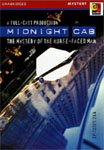 Season 1 – Episode 03 – The Mystery Of The Horse-Faced Man
Season 1 – Episode 03 – The Mystery Of The Horse-Faced Man
By James W. Nichol; Performed by a full cast
1 |MP3| – Approx. 30 Minutes [RADIO DRAMA]
Broadcaster: CBC Radio
Broadcast: November 28, 1992
Provider: Radio Mensa
Publisher: DH Audio / Paperback Audio
Published: December 1999
ISBN: 0886469856
A street freak gives Devereaux a present that stirs up Alphonso’s past. Where is he hiding out?
 Season 1 – Episode 04 – The Mystery Of The Motherless Child
Season 1 – Episode 04 – The Mystery Of The Motherless Child
By James W. Nichol; Performed by a full cast
1 |MP3| – Approx. 30 Minutes [RADIO DRAMA]
Broadcaster: CBC Radio
Broadcast: December 5, 1992
Provider: Radio Mensa
Publisher: DH Audio / Paperback Audio
Published: December 1999
ISBN: 0886469856
Julie Swenson comes to Toronto in search of her birth mother, but feels strange about her when they meet. Walker wants to help Julie, but it always seems to be too late.
Season 1 – Episode 05 – The Mystery Of The Falling Man
By James W. Nichol; Performed by a full cast
1 |MP3| – Approx. 30 Minutes [RADIO DRAMA]
Broadcaster: CBC Radio
Broadcast: December 12, 1992
Provider: Radio Mensa
Walker Devereaux, a 19-year-old aspiring writer, takes a job driving a cab. Lovable and intelligent but naïve, he stumbles on a succession of mysteries while working the graveyard shift. Unfortunately he is an amateur detective who can’t stop stumbling into trouble on Toronto’s dark side.
Season 1 – Episode 06 – The Mystery Of The Face In The Window
By James W. Nichol; Performed by a full cast
1 |MP3| – Approx. 30 Minutes [RADIO DRAMA]
Broadcaster: CBC Radio
Broadcast: December 19, 1992
Provider: Radio Mensa
A strange note appears in the glass donation ball of a mall Santa Claus. Cabbie Walker Devereaux, caught up by more than the spirit of the season, searches for the child who wrote the message and uncovers a much larger mystery.
Season 1 – Episode 07 – The Mystery Of The Child Holding A Dove
By James W. Nichol; Performed by a full cast
1 |MP3| – Approx. 30 Minutes [RADIO DRAMA]
Broadcaster: CBC Radio
Broadcast: December 26, 1992
Provider: Radio Mensa
A beaten woman stays over at Devereaux’s. She’s evasive because of an art theft and murder.
Season 1 – Episode 08 – The Mystery Of The Outdoorsman
By James W. Nichol; Performed by a full cast
1 |MP3| – Approx. 30 Minutes [RADIO DRAMA]
Broadcaster: CBC Radio
Broadcast: January 2, 1993
Provider: Radio Mensa
Back in Big River, a chance meeting leads to the truth about Devereaux’s father’s death.
Season 1 – Episode 09 – The Mystery Of The Screaming Woman
By James W. Nichol; Performed by a full cast
1 |MP3| – Approx. 30 Minutes [RADIO DRAMA]
Broadcaster: CBC Radio
Broadcast: January 9, 1993
Provider: Radio Mensa
Season 1 – Episode 10 – The Mystery Of The Drowning Man
By James W. Nichol; Performed by a full cast
1 |MP3| – Approx. 30 Minutes [RADIO DRAMA]
Broadcaster: CBC Radio
Broadcast: January 16, 1993
Provider: Radio Mensa
Season 1 – Episode 11 – The Mystery Of The Friendless Man
By James W. Nichol; Performed by a full cast
1 |MP3| – Approx. 30 Minutes [RADIO DRAMA]
Broadcaster: CBC Radio
Broadcast: January 23, 1993
Provider: Radio Mensa
Season 1 – Episode 12 – The Mystery Of The Vanishing Cab
By James W. Nichol; Performed by a full cast
1 |MP3| – Approx. 30 Minutes [RADIO DRAMA]
Broadcaster: CBC Radio
Broadcast: January 30, 1993
Provider: EnteringTheMindsEye.com
Season 1 – Episode 13 – The Mystery Of The Great Escape
By James W. Nichol; Performed by a full cast
1 |MP3| – Approx. 30 Minutes [RADIO DRAMA]
Broadcaster: CBC Radio
Broadcast: February 6, 1993
Provider: EnteringTheMindsEye.com
Season 2:
Season 2 – Episode 01 – The Mystery Of The Silver Rings
By James W. Nichol; Performed by a full cast
1 |MP3| – Approx. 30 Minutes [RADIO DRAMA]
Broadcaster: CBC Radio
Broadcast: December 8, 1993
Provider: EnteringTheMindsEye.com
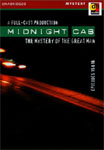 Season 2 – Episode 02 – The Mystery Of The Great Man
Season 2 – Episode 02 – The Mystery Of The Great Man
By James W. Nichol; Performed by a full cast
1 |MP3| – Approx. 30 Minutes [RADIO DRAMA]
Broadcaster: CBC Radio
Broadcast: December 15, 1993
Publisher: DH Audio / Paperback Audio
Published: January 2000
ISBN: 0886469945
Provider: EnteringTheMindsEye.com
 Season 2 – Episode 03 – The Mystery Of The Locked Room
Season 2 – Episode 03 – The Mystery Of The Locked Room
By James W. Nichol; Performed by a full cast
1 |MP3| – Approx. 30 Minutes [RADIO DRAMA]
Broadcaster: CBC Radio
Broadcast: January 5, 1994
Publisher: DH Audio / Paperback Audio
Published: January 2000
ISBN: 0886469945
Provider: EnteringTheMindsEye.com
Season 2 – Episode 04 – The Mystery Of The Screaming Kettle
By James W. Nichol; Performed by a full cast
1 |MP3| – Approx. 30 Minutes [RADIO DRAMA]
Broadcaster: CBC Radio
Broadcast: January 12, 1994
Provider: EnteringTheMindsEye.com
Season 2 – Episode 05 – The Mystery Of The Lost Child
By James W. Nichol; Performed by a full cast
1 |MP3| – Approx. 30 Minutes [RADIO DRAMA]
Broadcaster: CBC Radio
Broadcast: January 19, 1994
Released: 2009
Provider: EnteringTheMindsEye.com
This time a passenger takes Devereaux for a ride – into murder. A brutal kidnapping went wrong years ago, so two screwups try again on a bone-chilling night in Toronto.
Season 2 – Episode 06 – The Mystery Of The Family Portrait
By James W. Nichol; Performed by a full cast
1 |MP3|- Approx. 30 Minutes [RADIO DRAMA]
Broadcaster: CBC Radio
Broadcast: January 26, 1994
Provider: EnteringTheMindsEye.com
Season 2 – Episode 07 – The Mystery Of The Red-Headed Man
By James W. Nichol; Performed by a full cast
1 |MP3| – Approx. 30 Minutes [RADIO DRAMA]
Broadcaster: CBC Radio
Broadcast: February 2, 1994
Released: 2009
Provider: EnteringTheMindsEye.com
Devereaux’s best friend hooks up with a woman on the run. Can he uncover her dirty, deadly secrets fast enough to stop a killer?
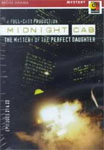 Season 2 – Episode 08 – The Mystery Of The Perfect Daughter
Season 2 – Episode 08 – The Mystery Of The Perfect Daughter
By James W. Nichol; Performed by a full cast
1 |MP3| – Approx. 30 Minutes [RADIO DRAMA]
Broadcaster: CBC Radio
Broadcast: February 12, 1994
Publisher: DH Audio / Paperback Audio
Published: December 1999
ISBN: 155204629X
Provider: EnteringTheMindsEye.com
 Season 2 – Episode 09 – The Mystery Of The Unsolicited Manuscript
Season 2 – Episode 09 – The Mystery Of The Unsolicited Manuscript
By James W. Nichol; Performed by a full cast
1 |MP3| – Approx. 30 Minutes [RADIO DRAMA]
Broadcaster: CBC Radio
Broadcast: February 19, 1994
Publisher: DH Audio / Paperback Audio
Published: December 1999
ISBN: 155204629X
Provider: EnteringTheMindsEye.com
Season 3:
Season 3 – Episode 01 – The Mystery Of The White-Eyed Cat
By James W. Nichol; Performed by a full cast
1 |MP3| – Approx. 30 Minutes [RADIO DRAMA]
Broadcaster: CBC Radio
Broadcast: January 6, 1996
Publisher: DH Audio / Paperback Audio
Published: July 2000
ISBN: 1552046443
Provider: EnteringTheMindsEye.com
Season 3 – Episode 02 – The Mystery Of The Unfit Mother
By James W. Nichol; Performed by a full cast
1 |MP3| – Approx. 30 Minutes [RADIO DRAMA]
Broadcaster: CBC Radio
Broadcast: January 13, 1996
Provider: EnteringTheMindsEye.com
Season 3 – Episode 03 – The Mystery Of The Secret Letters
By James W. Nichol; Performed by a full cast
1 |MP3| – Approx. 30 Minutes [RADIO DRAMA]
Broadcaster: CBC Radio
Broadcast: January 20, 1996
Provider: EnteringTheMindsEye.com
Season 3 – Episode 04 – The Mystery Of The Long Lost Brother
By James W. Nichol; Performed by a full cast
1 |MP3| – Approx. 30 Minutes [RADIO DRAMA]
Broadcaster: CBC Radio
Broadcast: January 27, 1996
Provider: EnteringTheMindsEye.com
Season 3 – Episode 05 – The Mystery Of The Back Door Key
By James W. Nichol; Performed by a full cast
1 |MP3| – Approx. 30 Minutes [RADIO DRAMA]
Broadcaster: CBC Radio
Broadcast: February 3, 1996
Provider: EnteringTheMindsEye.com
Season 3 – Episode 06 – The Mystery Of The Hidden Man
By James W. Nichol; Performed by a full cast
1 |MP3| – Approx. 30 Minutes [RADIO DRAMA]
Broadcaster: CBC Radio
Broadcast: February 10, 1996
Provider: EnteringTheMindsEye.com
Season 3 – Episode 07 – The Mystery Of The Olde Tyme Piano
By James W. Nichol; Performed by a full cast
1 |MP3| – Approx. 30 Minutes [RADIO DRAMA]
Broadcaster: CBC Radio
Broadcast: February 17, 1996
Provider: EnteringTheMindsEye.com
Season 3 – Episode 08 – The Mystery Of The Angry Son
By James W. Nichol; Performed by a full cast
1 |MP3| – Approx. 30 Minutes [RADIO DRAMA]
Broadcaster: CBC Radio
Broadcast: February 24, 1996
Provider: EnteringTheMindsEye.com
Season 3 – Episode 09 – The Mystery Of The Desperate Man
By James W. Nichol; Performed by a full cast
1 |MP3| – Approx. 30 Minutes [RADIO DRAMA]
Broadcaster: CBC Radio
Broadcast: March 2, 1996
Provider: EnteringTheMindsEye.com
Season 3 – Episode 10 – The Mystery Of The Woman in Black
By James W. Nichol; Performed by a full cast
1 |MP3| – Approx. 30 Minutes [RADIO DRAMA]
Broadcaster: CBC Radio
Broadcast: March 9, 1996
Provider: EnteringTheMindsEye.com
Season 3 – Episode 11 – The Mystery Of The Wounded Poem
By James W. Nichol; Performed by a full cast
1 |MP3| – Approx. 30 Minutes [RADIO DRAMA]
Broadcaster: CBC Radio
Broadcast: March 16, 1996
Provider: EnteringTheMindsEye.com
Season 3 – Episode 12 – The Mystery Of The Laughing Clock
By James W. Nichol; Performed by a full cast
1 |MP3| – Approx. 30 Minutes [RADIO DRAMA]
Broadcaster: CBC Radio
Broadcast: March 23, 1996
Provider: EnteringTheMindsEye.com
Season 3 – Episode 13 – The Mystery Of The Soft-Hearted Man
By James W. Nichol; Performed by a full cast
1 |MP3| – Approx. 30 Minutes [RADIO DRAMA]
Broadcaster: CBC Radio
Broadcast: March 30, 1996
Provider: EnteringTheMindsEye.com
Midnight Cab, the novel:
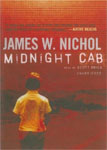 Midnight Cab
Midnight Cab
By James W. Nichol; Read by Scott Brick
9 CDs, 8 Cassettes or 1 MP3-CD – Approx. 11.7 hrs [UNABRIDGED]
Publisher: Blackstone Audio
Published: February 2005
ISBN: 9780786179923 (cd), 0786130121 (cassette), 0786182016 (mp3-cd)
In what serves as a sort of prequel to the series, Walker arrives in Toronto, intent on tracking down the parents who abandoned him. At the cab company where he works, Walker befriends the night dispatcher, Krista, a pretty, brave young woman. Wheelchair bound but resourceful, she helps him crack the code of his parents’ identity. But the quest to discover his mother’s whereabouts swiftly becomes perilous as Walker finds himself within the deadly grasp of Bobby, a young sociopath who has matured from early cruelty to murderous pleasure.
[via Radio Mensa and EnteringTheMindsEye.com]
Posted by Jesse Willis
P.S. CBC is still sitting on J. Michael Straczynski’s only radio drama series!

